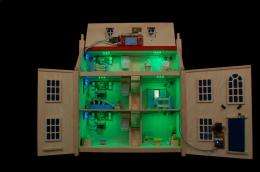Energy-Efficient Intelligent House that Can Learn our Routines

The first home in the UK which can learn from its residents and take decisive action and text if it is being burgled or the door has been left unlocked, will be unveiled this week in Cairo.
InterHome, a model for a home developed by researchers at the University of Hertfordshire, incorporates modular custom design units and draws on standard home automation systems which have been adapted so that the house ‘learns’ and ‘adapts’ to its users’ lifestyles. It will be unveiled at the finals of the Microsoft Imagine Cup which will be held in Cairo from 3-7July.
The prototype of the home, which has been developed in a doll’s house, integrates embedded devices with the industry standard X10, so that it provides convenience and security to the home owner and also enables them to reduce energy so that they make savings of up to £300 a year and contribute to reducing greenhouse and carbon emissions.
InterHome incorporates an intuitive touch screen user control panel that also allows the house to be monitored and controlled using web browsers, windows mobile and any SMS-capable mobile phone.
“InterHome improves on its competitors by being modular, adaptable and able to ‘learn’ our routines,” said Johann Siau, Senior Lecturer at the University’s School of Electronic, Communication & Electrical Engineering. “The technology enables the system to learn rapidly when we need the lights on or whether we are at home or at work and how the house needs to be at certain times of the day. If we forget to lock the front door or turn off the lights, it can text us and our response can reprogramme the system.
Through this approach, InterHome can eradicate wasted energy within UK homes and make a difference to CO2 emission statistics when installed in enough houses.
The prototype is now ready to be adopted by industry and the team led by Johann Siau, has been approached by several industry companies and are in discussion with the Building Research Establishment. The other members of the team are Ellis Percival and Carol Chen.
“The Imagine Cup world-wide final sees 400 of the smartest technical students from across the world compete head-to-head for the coveted trophy,” said Dr Andrew Sithers, Academic Relations Manager, Microsoft UK. “I’m delighted that Hertfordshire will be representing the UK at this event. Their Intelligent Home project demonstrates how innovations in software and hardware can be combined to produce a highly flexible integrated solution that has great go-to-market potential. I would like to wish Team UH the best of luck in Cairo!”
“It is a great achievement to have secured a place at the Imagine Cup finals in Cairo to represent the UK, it’s testament to the determination of Ellis and Carol and the support they have received from the University,” Ed Dunhill, Academic Developer Evalengelist, Microsoft UK, added.
Source: University of Hertfordshire (news : web)
















